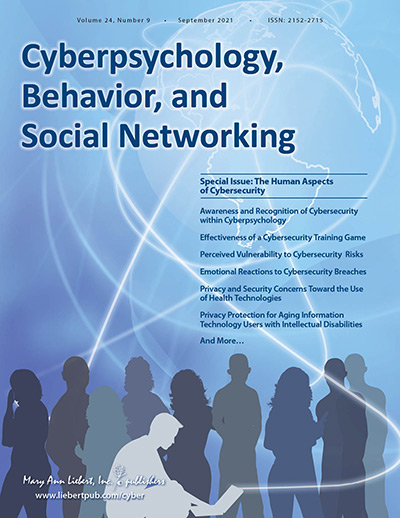For Immediate Release
Virtual Reality to Manage Psychological Distress in Adolescents
Contact: Kathryn Ryan
914-740-2250
kryan@liebertpub.com

New Rochelle, NY, September 29, 2021—A new systemic review found that all studies reported benefits when using virtual reality (VR) to manage psychological distress in adolescents. These benefits occurred across a range of treatment scenarios, according to the study published in the peer-reviewed journal Cyberpsychology, Behavior, and Social Networking. Click here to read the article now.
Adolescents face unique life challenges relating to puberty, schooling, self-identity, intimate relationships, and financial dependence. Adolescence is a critical period for the onset of mental health disorders.
Virtual reality is a promising treatment modality for mental health issues. It is a rapidly evolving field that involves the use of immersive computer technology to imbed users into interactive digital worlds.
The studies included in this report showed that VR interventions can quickly reduce negative symptoms. Both active (playing an interactive game) and passive (watching a movie) VR experiences were therapeutic for distressed adolescents. Adolescent participants rated their VR experience favorably and attrition rates were low.
“These preliminary findings suggest VR is a valuable treatment modality for adolescent psychological distress,” state Joshua Kelson, PhD, from Charles Sturt University, and coauthors. “However, conclusions on the effectiveness of VR in managing adolescent distress are limited by the lack of high-quality controlled studies, and the heterogeneity found in existing ones.”
“As a clinician, I have found adolescents, who have grown up with digital technologies, eager to embrace VR for therapy, training and education; it seems a natural way of learning and practicing new skill sets. However, as this review aptly notes, there is a critical need for more rigorous studies in this nascent field,” says Editor-in-Chief Brenda K. Wiederhold, PhD, MBA, BCB, BCN, Interactive Media Institute, San Diego, California and Virtual Reality Medical Institute, Brussels, Belgium.
About the Journal
Cyberpsychology, Behavior, and Social Networking is an authoritative peer-reviewed journal published monthly online with Open Access options and in print that explores the psychological and social issues surrounding the Internet and interactive technologies. Complete tables of contents and a sample issue may be viewed on the Cyberpsychology, Behavior, and Social Networking website.
About the Publisher
Mary Ann Liebert, Inc., publishers known for establishing authoritative peer-reviewed journals in many promising areas of science and biomedical research. A complete list of the firm’s more than 100 journals, books, and newsmagazines is available on the Mary Ann Liebert, Inc., publishers website.